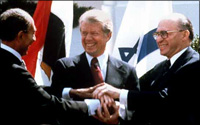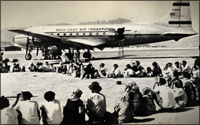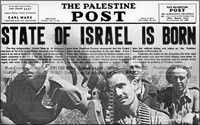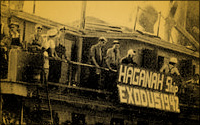 A number of events conspired in the 1950s to place Israel in a permanent position of war and severe danger. The first had to do with Joseph Stalin.
A number of events conspired in the 1950s to place Israel in a permanent position of war and severe danger. The first had to do with Joseph Stalin.
Beginning in 1949, the Soviet Union turned from one of Israel’s only allies into one of its staunchest enemies. Much of it was due to the fact that Russia’s hopes for a communist government in the Jewish state were dashed. Also, Stalin’s latent anti-Semitism began to surface more and more. From 1949 until his death it became a virulent, open form of murder that would have undoubtedly led to untold destruction of the Jewish people in Russia if he had not died. He concocted all sorts of plots. He eliminated the leading Jews in the Communist Party not only in Russia but in Poland, Czechoslovakia and Romania. As he did so, Russian propaganda against Israel become more pronounced. Russia joined the Arabs in a common cause for many reasons, but anti-Semitism was part of it.
The second thing was a change in the world’s outlook toward the Jewish people. Israel made the “mistake” of winning the war in 1948. The new image of the Jew was tough, aggressive, hard-nosed and abrasive. As early as the end of 1949, the General Assembly of the United Nations, which two and a half years earlier had voted for the creation of the Jewish state, now voted (38-14) that Jerusalem should be an international city run by the United Nations. From that time onward Israel was on the losing side of United Nations votes.
Rise of Nasser
The third factor that changed was the government in Egypt.
The old king, Farouk – one of the most corrupt and despicable people on the planet – was deposed. The military staged a revolution led by Colonel Mohammed Naguib. But the man who was really behind it was a captain named Gamal Abdel Nasser.
Early on he was unsure of the best policy toward Israel. A part of him thought making peace with them was best. Egypt should attend to its problems and become a modernized, strong socialist country, rather than blame their problems on the Jews.
Another part of him wanted to be leader not just of Egypt but the entire Arab world. His dream was pan-Arabism – the fiction, really, that the Arabs are one country that stretches from one end of Africa to across the Fertile Crescent, all the way up to Afghanistan and India. In order to be leader of all Arabs he realized that he had to take the strongest and hardest stance against Israel. His shortest ticket to greatness was by leading the Arabs to victory through violence and war.
Designs on the Suez
Nasser also wanted to evict England from the Suez Canal and nationalize it for Egypt. It was not only a matter of money, which was considerable, but also Egyptian national pride. He dreamed of an enormous dam at the beginning of the Nile (the Aswan Dam), which would regulate the river, prevent yearly flooding and provide irrigation and hydro-electric power. It would make Egypt a modern country. Although it would cost billions of dollars, and was unproven if it would really work, he became obsessed with the idea.
The United States, through Eisenhower and Dulles, encouraged the project and led Nasser to believe that they would fund it somehow. However, just as they were ready to go ahead, the United States backed out for various political and economic reasons. In a fit of rage, Nasser turned away from the West and struck a deal with Russia, who helped him build the dam. Russia also provided him with weapons to rearm the Egyptian army, and sent in military advisors and trainers.
To drive home the point, Nasser evicted the British from the Suez Canal and nationalized it. In effect, if England wanted to retain control they would have to send a full scale army to topple Nasser. In the early 1950s, England was in no position to do so. Its wealth and empire, along with its will for world domination, were gone. Therefore, they acquiesced. Nasser enjoyed a cheap and brilliant victory, one that gained him supremacy in the Arab world.
State Sponsored Terrorism
Nasser turned now toward Israel, and inaugurated a tactic that remains part of the Arab world today: state sponsored terrorism.
He equipped people called Fedayeen, raiders from the Gaza Strip, to cross the border. They burst into Jewish schools and machine-gunned Jewish children. They blew up farms, planted land mines and so on. That began in the early 1950s and continued.
The object of state-sponsored terrorism is to wear the enemy down – without going so far as to start a war. This creates a dilemma for the victimized country: how much to take and how to retaliate. The Israelis retaliated with commando raids. They entered the Gaza Strip and blew up buildings.
Instead of inching toward peace there now existed a virtual state of war – a war that neither side could win. Every day it took its toll in lives, money and resolve. But that was Nasser’s plan.
This tactic was further encouraged by the Syrians in the north. They shelled the Israeli kibbutzim along the border almost every day for 19 years. There were families who grew up sleeping in bunkers every night. The shelling forced the Israelis to respond, of course. Here, too, a real war, albeit relatively low scale, took shape.
The Jordanians, who controlled the Old City of Jerusalem, also created problems. They placed snipers who would shoot at Jewish civilians, including housewives, on the Jewish side. It forced the Israelis to building very high walls to protect apartment buildings.
Jews were under a virtual siege in their own land. There was a terrible constant tension. Whenever they responded to an attack they were condemned in the United Nations. It was a no-win situation.
King Abdullah’s Reward
As the Soviets threw their support completely behind Nasser, King Abdullah of Jordan signaled that he was ready to enter into negotiations with Israel toward peace. Yet, because of the pressure from Nasser and the hardliners he was forced to retract and publicly took the opposite stand. There would be no solution to the problem of Israel, he said, nor any peace between Jews and Arabs, “as long as a single crumb remained in enemy hands.”
“Peace with Israel is unthinkable,” he said. “The Arabs will not agree to peace as along as the Jews live in the heart of Arabs states, sowing unrest and fear in our midst. Our first round, unfortunately, was unsuccessful. There is no doubt that the Arabs will prepare for a second round with all their energy and be successful.”
This public belligerence toward Israel did not save King Abdullah. He was rewarded by getting assassinated by Arabs on his way out of a mosque after Friday morning prayers. It taught others who might have thought about making peace a powerful lesson.
Strange Bedfellows
Nasser closed the Suez Canal to Israeli shipping and raised the pitch of his anti-Israeli rhetoric.
In an interview in the New York Post, he said that he was not fighting Israel alone, but also international Jewry and the wealth of the Jews that oppressed mankind all over the world – echoing, of course, Hitler.
As he became more and more emboldened in his brazenness, his enemies took notice. England still felt the sting that it had been thrown out of the Suez Canal. France was just beginning to be engaged in a long and bloody war in Algeria – a local war against Arabs that France would lose. Israel, for its part, was looking to eliminate Nasser.
They three developed a plan: As Israel invaded and drove toward the Suez Canal, the British and French would piously announce that Israel had to stop and in order to separate the combatants they would send in their armies and navies to see to it that peace was restored. In the process the British would take back the Canal and Nasser would be eliminated.
The Sinai Campaign
In October 1956, Israel invaded. They drove through the Sinai and Gaza as planned, forcing the Egyptians into a retreat. They even encircled parts of the Egyptian army, destroying two or three armed corps. In about four days, they came within 18 miles of the Suez; within six days they were at Sharm el-Sheikh at the tip of the Sinai Peninsula.
England and France parachuted their troops into the Suez area and defeated the Egyptian garrison. Nasser, however, scuttled ships and blocked the Canal.
Then the unthinkable happened: the United States joined Russia in demanding that England, France and Israel withdraw. Eisenhower and Dulles were in a cold rage that they were betrayed by their allies, who did not tell them anything about the plan. They pressed their case in the United Nations. England and France invoked their veto in the Security Council, but in the General Assembly the votes were overwhelming against them.
Instead of collapsing, Nasser became a hero. With Russia’s backing, Egypt insisted they were the victims of aggression and that all foreign troops had to withdraw. The United States forced Israel to agree to a withdrawal.
By March 1957, the Israelis had completely withdrawn from Sinai.
Aftermath
Ben Gurion said that it was probably a wasted war. It did not fulfill its major objectives. Most of all, Nasser was still in power and actually stronger.
However, he also made a bad mistake. Coveting the wealth of Saudi Arabia, he supported a rebellion in Yemen. A surrogate war ensued, pitting Egyptian proxies against Saudi proxy armies, leading to a stalemate in Yemen.
Rather than accepting it, Nasser made the mistake of sending Egyptian troops into the Arabian Peninsula, launching a long, bloody war of attrition. In the next six or seven years, tens of thousands of Egyptian soldiers lost their lives. Nasser gained nothing – except the enmity of a great portion of the Arab world. When he was threatening Jews they loved him. When he was fighting Arabs they hated him.
Nasser also tried to absorb Syria into Egypt, calling it the United Arab Republic. Even though Nasser took over Syria, it was a very unstable unification that lasted not more than five years. In the end, he was unable to hold it. This left him even more economically and politically bankrupt and frustrated. He was a ticking time-bomb, one that would explode in 1967.
Israel, for its part, had established itself as the strongest military power in the Middle East, but lost a great deal of diplomatic support. It had gained a United Nations promise to protect its southern border, but that would prove worthless when it mattered in 1967. Overall, the problems the Jewish state faced at its inception were no closer to being solved. They still suffered unremitting enmity, isolation, tremendous internal problems and a future that looked no brighter than before.











